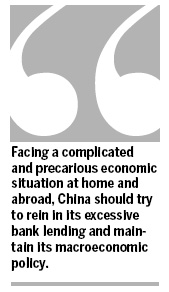Op-Ed Contributors
The rush to untie purses
By Sun Lijian (China Daily)
Updated: 2010-03-09 07:50
 |
Large Medium Small |
Wen makes sweeping vows to raise incomes, create new jobs and drive innovation but tough challenges lay ahead
Premier Wen Jiabao set an 8 percent growth target for this year and outlined measures to make that goal a reality in his government work report to the ongoing third session of the 11th National People's Congress (NPC), the top legislature, on Friday.
The wide-ranging report, which did not avoid discussing major problems in the country's economy while looking back on last year's merits, reflected the government's aims of exploring a sustainable growth model and its substantial efforts to eradicate a string of lingering effects and difficulties remaining from the global financial crisis.
| ||||
A prolonged decline in income growth, especially among the middle and lower class in underdeveloped rural and inland areas, poses a major obstacle to the country's efforts to expand domestic spending.

Premier Wen listed a series of solutions, from developing agriculture and rural economy, realizing urbanization and making progress on a balanced and coordinated development between rural and urban areas.
He also vowed to take workable steps to create new jobs and facilitate the growth of incomes. But Wen's remarks should not be simply looked upon as moves by the government to raise wages nationwide. A blanket and unspecific growth of income is unlikely to bolster sustainable consumption and will possibly undermine the country's economic vigor if the growth is not linked to creative production actions.
Any plan to increase incomes should be mainly based on market factors other than unreasonable and government-manipulated distribution of social resources. We should not be excessively concerned about the recent "shortage of migrant workers" in some coastal regions given that such a shortage is expected to ignite competition in markets and prompt employers to improve their treatment of employees.
Concerning domestic consumption, viable measures should be taken to improve the livelihood of people and dispel their deep-rooted fears of exhausting their savings. Premier Wen urged to build more housing as well as improve healthcare and the social security system. He said there will be a plan to build people's confidence in the consumption market. If these are effectively fulfilled, they will help Chinese people feel at ease when they untie their purses more willingly.
The country's widening income gap has also greatly impacted its efforts to expand domestic demand. A reasonable tax policy and an even distribution of national wealth that is aimed at raising the income for the poor are indispensable to sustainable economic growth and social harmony. But foreign experiences indicate that high taxation would also likely drain domestic capital and thus increase the country's costs on taxation. Thus, the country should create an ideal environment for those with wealth to consume at domestic markets and prevent pushing them from spending in foreign markets.
The rush among wealthy Chinese to foreign countries has to some extent led to foreign misconceptions about China's actual domestic spending abilities. This misjudgment and overestimation have contributed to growing foreign pressures on China to open its domestic market and revalue its renminbi, which add new uncertainties to the Chinese economy.
Boosting the competitiveness of domestic businesses is also a huge challenge. In his report, Premier Wen emphasized several times the importance and necessity of lifting innovation.
Amid ever-growing pressures to improve the livelihood of people, protect the environment, and smooth out increasing trade frictions with foreign countries, boosting competitiveness is a tough task if the country continues to rely on its past economic model of exports, cheap labor, high investments and high emissions.
The government is determined to cultivate the country's innovative ability and forge its own world-class brands. It is also committed to improving technology and financial services to rebrand China's long-standing image that it is the world's factory of cheap products. That may best explain Premier Wen's reaffirmation in his report of the country's plans on developing the low-carbon economy, biological technology and life sciences and its plan to create an international financial center.
The nascent global economic recovery has greatly boosted people's confidence in the future of the world economy. However, the emerging sovereign debt crisis in Greece has added new uncertainties in the EU and the global financial market. The unresolved disputes on climate change left after the Copenhagen conference indicate that the low-carbon economy still needs time to become a reality. And the flooding fluidity, growing risks from inflations and property bubbles are likely to sink the global economy if not effectively checked.
Facing a complicated and precarious economic situation at home and abroad, China should try to rein in its excessive bank lending and maintain its macroeconomic policy to avoid any possible catastrophe by an abrupt policy reversal.
The author is a vice-president of the School of Economics at Shanghai-based Fudan University.
(China Daily 03/09/2010 page9)













